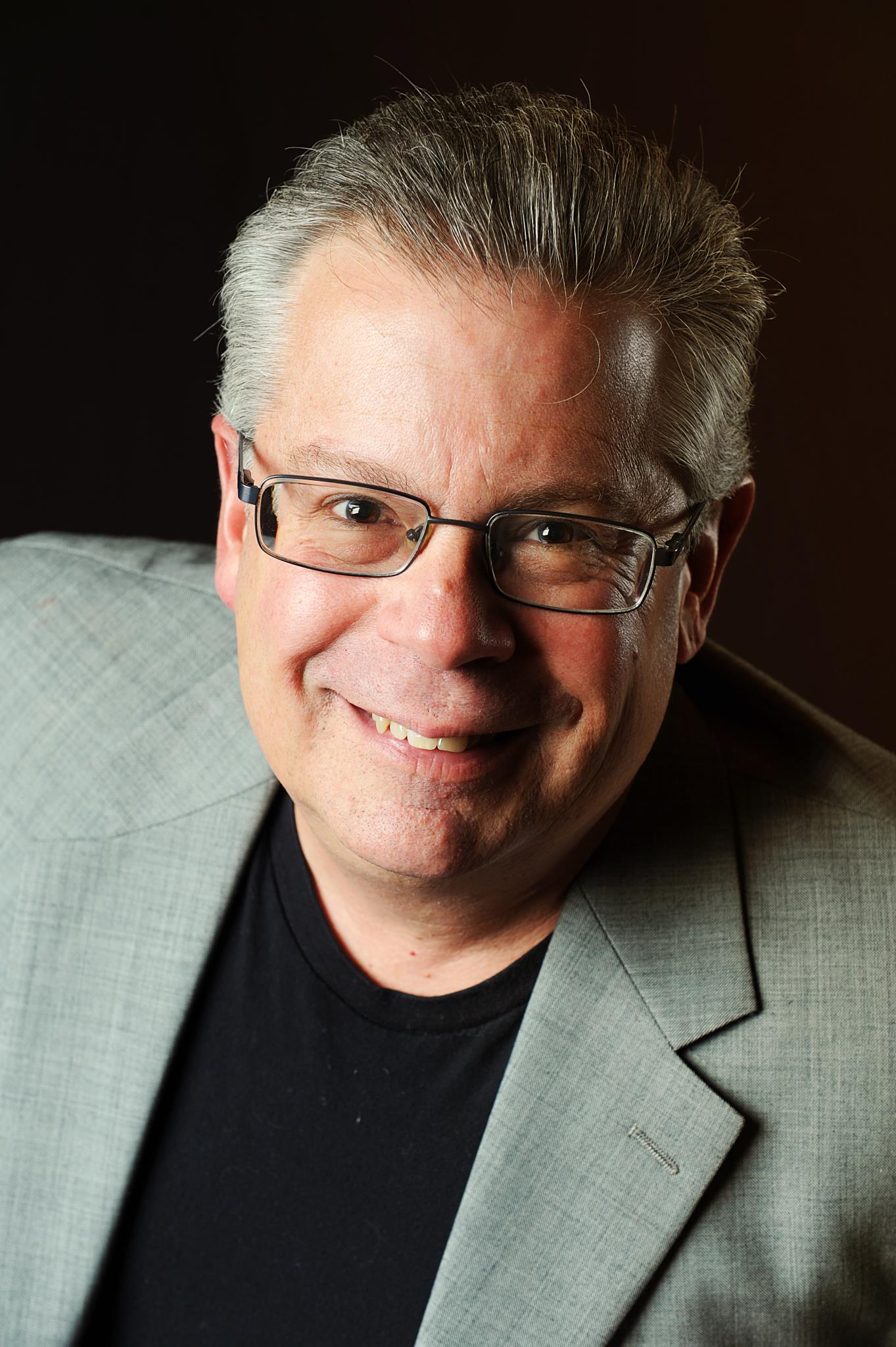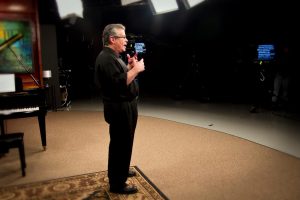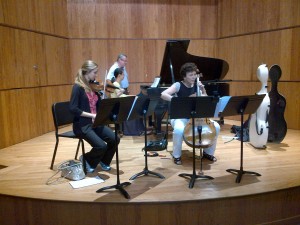 Thank you all for the wonderful submissions made at my request last week to name my next The Great Courses survey. I will select my 5-10 favorites and present them to you later this week for your vote. I will deliver the results to The Great Courses with the hope that they will indeed let the majority rule.
Thank you all for the wonderful submissions made at my request last week to name my next The Great Courses survey. I will select my 5-10 favorites and present them to you later this week for your vote. I will deliver the results to The Great Courses with the hope that they will indeed let the majority rule.
A New Direction?
As a self-employed musician-writer, who spends his working days at home, alone at the computer, I can forget how very intelligent and creative the collective can be. You have reminded me of that creative intelligence with your many suggestions and comments regarding my upcoming course. So: using you as a resource and as a sounding board, I’d like to tell you about my plans for the future and in doing so again solicit your suggestions and advice. (If anyone wants to respond privately, or at greater length than Facebook provides, feel free to contact me on this site.)
Background
For many years, I taught something I called “Living Room Classes” here in the San Francisco Bay Area. They were just that: classes taught in the evening to interested adults in various living rooms across the Bay Area. It was thanks to these classes – much more than my actual classroom teaching – that I learned how to teach music to adults with a minimum of jargon and a maximum of fun. I stopped doing the Living Room Courses in 1999, two years before I resigned my tenure at the San Francisco Conservatory, all in order to concentrate on writing courses for The Teaching Company (The Great Courses).
It’s time for me to start teaching again, though technology has most certainly changed the equation. Instead of the public coming to me, I can go to you – anywhere – via the net. I have decided to start teaching online, and I need your advice regarding all sorts of things, from format to content to pricing to . . . well, everything.
Webcasts vs Webinars
The first big decision I need to make is whether to create webcasts or webinars. A webcast would be a straightforward lecture; I would use musical examples provided I could find royalty-free performances to draw on. A webinar would be interactive: I would deliver prepared material but then also take Q&A and – I hope – get a discussion going. For myself, I would much prefer the webinar format. It’s my impression that I’d have a good bit more freedom to use recorded music during a live broadcast. The webinars may (or may not) then be posted on YouTube, with (or without) the musical examples. So: webcast or webinar? (BTW: if there is a copyright lawyer out there who can help guide me through the minefield that is “fair use” I’d be forever grateful to hear from you. Forever. Freaking. Grateful.)
Time and Cost?
My impulse is to create multi-session courses rather than single, self-standing lectures. Such courses would complement the work I’ve done for The Great Courses.
So: do you agree with my impulse towards multi-session courses? If so, approximately how many sessions feels right: 6, 8, 10? More? Fewer? How long would you like each session to be? 60 minutes; 90 minutes? Should the sessions be daily, weekly, bi-weekly, or monthly? What would you feel is a fair price for such a session? (I’m figuring that folks can pay as they go or subscribe – at a discount – to a complete series. Yes?)
 Subjects of interest?
Subjects of interest?
For years (and years and years) the numero uno course I’ve wanted to make for The Great Courses is a comprehensive history of twentieth century music. However, the licensing costs of acquiring recordings of that much music still under original copyright is so prohibitive as to make such a course a total non-starter. However. If the participants in such a course all downloaded the same recordings from iTunes, we could simply listen to the same carefully selected excerpts together, on our own recordings. The licensing issues thus avoided, we could have a helluva good time together, 16-24 sessions. Whoa; be still my heart. What do you think?
Here are some other topics I’d be ready to run with immediately (meaning late fall, 2015):
- Mozart in Vienna: The Late String Quartets and Quintets
- The String Chamber Music of Brahms
- The Chamber Music of Mendelssohn
- The Chamber Music of Dvořák
And even further beyond:
Provided success with this model, I would be happy to start writing courses exclusively for the webinars. Most notable would be a comprehensive course on the life and music of Chopin, made possible by the fact that a saint named Aaron Dunn is currently arranging for the recording of all of Chopin’s music, to be available free-of-charge to anyone who wants to use it. If I could find recordings to use, I would do a Symphonies of Mahler course in a heartbeat. I would as well, if anyone were interested, do a course ON MY OWN MUSIC, an act of such self-indulgent chutzpah that I’m embarrassed to have actually broached it, but there you go, I can’t un-write it.
There you have it: at age 61 it’s time to retool, reinvent and to explore a new paradigm. Any and all comments and advice are invited. If anyone has advice to offer re: platforms, I’m all ears.
I look forward to hearing from you!



Yes, no, yes, yes, sometimes, absolutely, not sure, yes, no….. 🙂 I’ve taught online business and accounting courses, but nothing this complex. I’ve also gone through so many courses through the Teaching Company with you, and enjoyed and learned from them all. A friend was in tears at the end of your Mozart biography! As a teacher/professor, I also get locked into my own little world and have learned (later in life) to use our collective intelligence, judgment, and ideas. You have many loyal “students” and the ideas will flow. The music, your knowledge, and your joy and humor in what you do will carry you through, regardless.
Thank you.
p.s. At 66, the reinvention process is happening here also. “You know you are at the end when there are no more beginnings.”
Bob,
I just read your blog on your next phase of teaching, and I’m happy to share my thoughts with you.
First, some background. I received my Ph.D. in Medieval literature in 1982, and I spent the next 20+ years on the English faculty at UCLA. I inherited a course—The English Bible as Literature—when a colleague retired; it became my flagship course, growing from 12 to 200+ students per quarter. Soon I began teaching my class in parishes throughout southern California and Arizona. I retired from UCLA in 2005, and I focused on my biblical courses. I did so for two reasons: 1) I loved the topic—great stories and
great literature in a variety of genres; and 2) the income potential was exceptional.
Today the courses I developed generate four revenue sources:
1) Live classes. I teach through the entire Bible, verse-by-verse, Genesis through Revelation (each course takes a 10-week quarter to complete, 20 lectures; it takes 7 years to complete the entire Bible—“stability of employment!”). Importantly, these are literary classes, not religious classes, distinguishing my teaching from the standard religious fare. I teach four classes weekly: two in San Diego; one in Orange County; and one in Los Angeles. Each class consists of two one-hour lectures, and I write Power Point presentations for each of the two weekly sessions; I currently have about 500 students per week at $85.00/quarter). I record the lectures weekly, have them studio edited and post them on my web site: logosbiblestudy.com, under “Logos Classroom.” They are free to listen to; they can be downloaded for $.99 per lecture; when I finish a course, I produce the entire course for download (at $19.95) or in MP3 format ($29.95). These are available in the “Logos Store” on my web site.
2) I previously recorded a 7-year cycle (audio only) during 2005-2012; it consists of about 500 hours of lecture: I call it the “Classic Edition.” The live classes could receive lower-division undergraduate credit through the University of San Diego, if students were concurrently enrolled. This series is available on Audible.com. I have a 3-year contract with Audible: they paid me up front on a non-exclusive licensing agreement, and they committed to promote my material. If you buy anything relating to the Bible on Amazon/Audible, my material appears as a “recommendation.” In 2014 I had 16,000+ downloads.
3) I taught a course “through the Bible” in one year, 80 lectures. I recorded those lectures, and I developed them into a mobile application: the “One-Year Bible.” It is on all platforms, in all mobile app stores.
I launched the app last November (2014), and to date it has had over 62,000 downloads at $4.99 each (the stores take 1/3 of the revenue). This has been a big hit! To promote it I developed a free app, “Bible in a Nutshell,” in which I teach through the entire Bible in 80 minutes. Have a look at my web
site, under “Mobile apps”; I plan to produce more.
4) I run four “teaching tours” each year, one per quarter. The flagship tour is to
Israel, “The Footsteps of Jesus,” a 12-day tour with 40 paxs. Priced correctly, this generates about
$500/pax. Others are on my web site under “Logos Travel.” The key to travel is having a constituency that wants to travel with you and to be able to access them; the agency is simply a paid provider—they work for you as a vendor, not you for them.
The key to all of this is to own copyright and trademarks to all of your material and to sell it directly or to license it, not to sell it or accept “royalities.” I have an excellent intellectual property attorney, Michelle Donovan at Duane Morris Associates; her phone number is 619-744-2200; tell her I referred you.
Your Teaching Company courses are excellent, and you are a superb lecturer; I have taken all of your courses through the “Great Courses.” Striking out on your own is a big step and a lot of work. I know you’ve tried travel and Ora TV, but they seem not to be optimal. You can do better. I don’t know if you have access to your Teaching Company student database, but you should obtain it if possible. It takes years to build a solid database otherwise. You clearly have very dedicated students (I’m one of them), and they will follow you wherever you go.
If you’d like to talk more about this, I’m happy to do so by email, phone or in person: billcreasy@aol.com.
PLEASE DELETE THIS CORRESPONDENCE FROM YOUR PUBLIC BLOG, AS IT CONTAINS VERY PERSONAL AND CONFIDENTIAL INFORMATION.
Dr. Bill Creasy
I have lots of experience with webcasts and webinars. I think for your purposes webinars are best. You’ll be able to use slides, record the presentation (although you may want to record a version from home with better quality sound). Look no further than GoToWebinar for your needs. It’s the best platform.
In many markets/niches the 8-12 session (weekly) works best. However, I think music lovers such as myself would be willing to sign up for as many sessions as you’re willing to create!
Many people nowadays subscribe to Spotify. Many excellent recordings are available on Spotify from the big companies. You can create a playlist on Spotify and share it with others. In this way, all of your students could access your playlist and we could follow along and listen to the recordings on our free time. And that would be more cost-effective – $10 for people to subscribe or FREE if they are willing to put up with ads.
The 20th century music course is the one I’d be quite interested in myself, including the music of Robert Greenberg that I’m eager to discover!
Symphonies of Mahler seems like a great missing piece in the Great Course series. My second vote for that one.
Anything on Mozart is always a treat! Although having listened to the Chamber Music of Mozart, seems like the Dvorak course might fill a missing gap. The Brahms one is a great idea. But what about Schubert? Exploring Lieder would also be great.
I’m in for Chopin too!
Hey Bob-
A new course from you is always an exciting prospect, in whatever format you decide to use. Providing it would available if you couldn’t listen live, I do not have strong feelings about webcast versus webinar. I would think a weekly session, at least 60 minutes long, anywhere from 2 to 6 months long, depending on the subject being covered. I don’t know how much people would be willing to pay- $20 a lecture? As someone who would pay to hear you read the phone book, I am probably not the best person to ask what the market will bear. I also think it would be fun and easy for people to get the musical examples from their favorite digital music source.
On another subject, but still on the subject of creating a revenue stream from your intellectual property, have you ever considered e-publishing or self-publishing your WordScores? I don’t know how much work it would take to get them in a publishable format, but I do know that I treasure the complete scores that I have from various lectures, and I despair at how much I am missing when I listen to pieces for which I have either an incomplete score or no score at all. Especially when I am pretty sure that you have the complete score squirreled away somewhere…I would think there would be many marketing opportunities for these – either as individual scores for specific concerts or lectures, a collection complementing your web or teaching company lecture series, collected scores by composer, WordScores of the Month Club, the Collected WordScores of Robert Greenberg, etc. I don’t have any personal experience with e publishing, but I have a good friend who is an author who has created a good business from e publishing her own titles once the rights have reverted to her after traditional publishing. Just one more thing to consider as you build your media empire!!
Looking forward to whatever you decide!
I believe this is a matter of, “If you build it, they will come.” I’m interested in any and all music history topics you’re willing to spend the time to develop and share.
I have home schooled my children for well over a decade and have always appreciated new and exciting ways to present new material. Our oldest is now in University (Faculty of Music) with the goal of completing her Ph.D. in Musicology. We always watched and hoped for a new course that would support more advanced music theory such as a Harmony or Counterpoint and Analysis, it has been wonderful to view the historical courses and they have added so much to our studies but there is just not enough outside of a traditional class setting in resource/support material via DVD that could be so valuable to those who learn outside the box. I still have children at home and hold out hope for such curriculum resources to become available. We have appreciated your work over the years, and look forward to seeing what is coming up next in your DVD series. Keep up the great standard of work!
The Gazso Clan
Please- a sequel to your Understanding Fundamental Music Series, I.e. Advance Music Theory and Application, Composition, Arranging, etc., even using your works as a starting point.
As a busy working professional who’s also a serious music hobbyist, I find your Great Courses series the best thing out there- something that works with my time, busy lifestyle, and non-retiring mind.
I have taken a few webinar classes over the last couple of years, and love this medium. The live classes are great for question and answer, if the time just happens to work- considering time-zone and everybody’s preference is the hard part. (Like any real class or radio talk show, you hope your participants will only ask relevant questions so it won’t be a drag.) Some other webinar classes are offered with recorded lectures and a weekly chat, or you can submit questions throughout the week to be answered in subsequent lectures. I find recorded lectures helpful especially if I can watch over my smartphone. Webex does not allow that which is a pain.